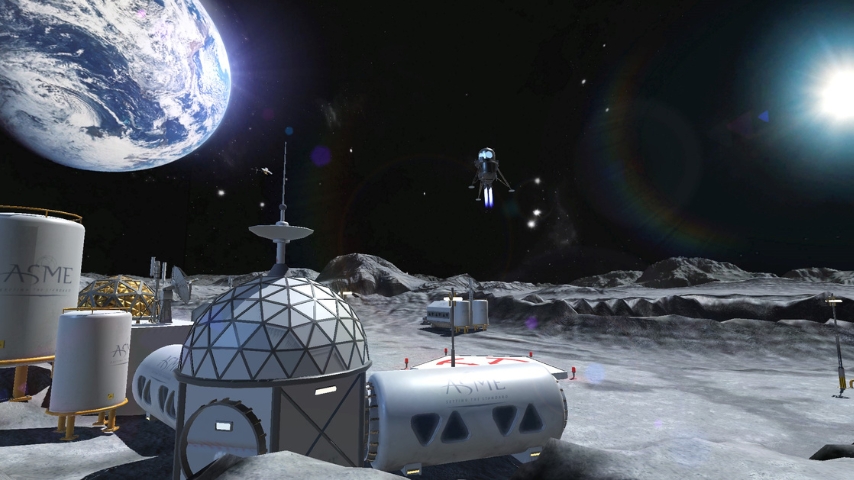ASME’s Virtual E-Fest Tech Connect 2025
ASME’s Virtual E-Fest Tech Connect 2025


ASME’s global virtual event for engineering students and early career engineers offered technical and soft skill sessions, networking opportunities, unique digital Landmark experiences, and more.
Engineering students and early career engineers from around the globe attended the virtual March event, ASME’s E-Fest Tech Connect. The event (formerly E-Fest Digital) was made up of career and professional technical and soft skill sessions, networking opportunities, awards celebrating engineers who are making a difference, and live finals of the Extended Reality Challenges—Extended Reality Challenge (XRC): Lunar Lander and XRC: Autonomous Vehicles Competitions.
For the first time ever, collaborative sessions brought ASME Digital Landmarks to E-Fest. Attendees experienced five incredible engineering milestones through fully immersive digital twin models including: Aeronautica Macchi MC.72 Seaplane, Crocodile Locomotive Ce 6/8 II, Pratt & Whitney Single Crystal Turbine Blade, Lensometer, and Carpet Tufting Apparatus. The digital twins featured interactive elements and game-like designs, providing attendees with a unique and engaging way to learn about engineering achievements.
Mechanical Engineers and the role they take in transforming healthcare took center stage as Gopika Ganga Nair, process & program engineer, GE Healthcare India examined innovations, designing life-saving medical devices, and optimizing manufacturing processes. She made it clear that mechanical engineers continue to play a crucial role in improving global healthcare outcomes.
Nair explained that while nurses and doctors are the characters most people think of when healthcare is talked about, the technology and products these professionals use every day are part of mechanical engineers’ scope of work. This session explored how fundamental mechanical engineering concepts—such as fluid dynamics, thermodynamics, materials science, and machine design—are applied in medical technology. It also provided insights into the rapid growth of the MedTech industry, career opportunities, and India’s rising contribution to the global healthcare market.
One of the day’s featured sessions included, “Live from EFx NDU—AI in Fighter Jets—The Rise of Machine Pilots.” This session looked at a future where AI is not just an assistant but a dominant force in aviation, shaping flight control, decision-making, and air combat. In this session, alongside a seasoned fighter jet pilot, attendees explored AI’s journey from basic automation to its integration in modern fighter jets.
Joe Bitar, lieutenant colonel (retired) and fighter pilot and Instructor explained, “Imagine for a moment, a fighter jet thinking and making life or death decisions without a human in control.” He covered how AI processes radar, satellite, and sensor data to enhance pilot performance, trains through millions of simulated dogfights, and saves lives with systems like Auto-GCAS. With real-world case studies and expert insights, he uncovered how AI is actively redefining the future of aviation.
Stay in touch with ASME and learn more about our upcoming virtual events (E-Fest Careers and E-Fest Tech Connect), student competitions and in-person events (EFx events held globally). Click here to join our mailing list.
For the first time ever, collaborative sessions brought ASME Digital Landmarks to E-Fest. Attendees experienced five incredible engineering milestones through fully immersive digital twin models including: Aeronautica Macchi MC.72 Seaplane, Crocodile Locomotive Ce 6/8 II, Pratt & Whitney Single Crystal Turbine Blade, Lensometer, and Carpet Tufting Apparatus. The digital twins featured interactive elements and game-like designs, providing attendees with a unique and engaging way to learn about engineering achievements.
Mechanical Engineers and the role they take in transforming healthcare took center stage as Gopika Ganga Nair, process & program engineer, GE Healthcare India examined innovations, designing life-saving medical devices, and optimizing manufacturing processes. She made it clear that mechanical engineers continue to play a crucial role in improving global healthcare outcomes.
Nair explained that while nurses and doctors are the characters most people think of when healthcare is talked about, the technology and products these professionals use every day are part of mechanical engineers’ scope of work. This session explored how fundamental mechanical engineering concepts—such as fluid dynamics, thermodynamics, materials science, and machine design—are applied in medical technology. It also provided insights into the rapid growth of the MedTech industry, career opportunities, and India’s rising contribution to the global healthcare market.
One of the day’s featured sessions included, “Live from EFx NDU—AI in Fighter Jets—The Rise of Machine Pilots.” This session looked at a future where AI is not just an assistant but a dominant force in aviation, shaping flight control, decision-making, and air combat. In this session, alongside a seasoned fighter jet pilot, attendees explored AI’s journey from basic automation to its integration in modern fighter jets.
Joe Bitar, lieutenant colonel (retired) and fighter pilot and Instructor explained, “Imagine for a moment, a fighter jet thinking and making life or death decisions without a human in control.” He covered how AI processes radar, satellite, and sensor data to enhance pilot performance, trains through millions of simulated dogfights, and saves lives with systems like Auto-GCAS. With real-world case studies and expert insights, he uncovered how AI is actively redefining the future of aviation.
Stay in touch with ASME and learn more about our upcoming virtual events (E-Fest Careers and E-Fest Tech Connect), student competitions and in-person events (EFx events held globally). Click here to join our mailing list.







